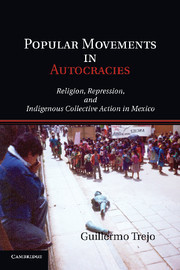Description
Popular Movements in Autocracies
Religion, Repression, and Indigenous Collective Action in Mexico
Cambridge Studies in Comparative Politics Series
Author: Trejo Guillermo
A new explanation of the rise, development and demise of social movements and cycles of protest in autocracies.
Language: English
Subject for Popular Movements in Autocracies:
Approximative price 32.87 €
In Print (Delivery period: 14 days).
Add to cart
Popular Movements in Autocracies
Publication date: 07-2014
Support: Print on demand
Publication date: 07-2014
Support: Print on demand
Approximative price 92.03 €
In Print (Delivery period: 14 days).
Add to cart
Popular movements in autocracies: religion, repression, and indigenous collective action in mexico
Publication date: 08-2012
339 p. · 16.3x24 cm · Hardback
Publication date: 08-2012
339 p. · 16.3x24 cm · Hardback
Description
/li>Contents
/li>Biography
/li>
This book presents a new explanation of the rise, development and demise of social movements and cycles of protest in autocracies; the conditions under which protest becomes rebellion; and the impact of protest and rebellion on democratization. Focusing on poor indigenous villages in Mexico's authoritarian regime, the book shows that the spread of US Protestant missionaries and the competition for indigenous souls motivated the Catholic Church to become a major promoter of indigenous movements for land redistribution and indigenous rights. The book explains why the outbreak of local rebellions, the transformation of indigenous claims for land into demands for ethnic autonomy and self-determination, and the threat of a generalized social uprising motivated national elites to democratize. Drawing on an original dataset of indigenous collective action and on extensive fieldwork, the empirical analysis of the book combines quantitative evidence with case studies and life histories.
Part I. Theory: 1. A theory of popular collective action in autocracies; Part II. Protest: 2. Accounting for Mexico's cycle of indigenous protest: quantitative evidence; 3. Competing for souls: why the Catholic Church became a major promoter of indigenous mobilization; 4. Competing for votes: how elections and repression shaped Mexico's cycle of indigenous protest; Part III. Rebellion: 5. A call to arms: regime reversion threats and the escalation of protest into rebellion; 6. From social movement to armed rebellion: religion, repression, and the microdynamics of rebel recruitment; Part IV. The Politicization of Ethnicity: 7. Politicizing ethnicity: the breakdown of religious and political monopolies and the rise of indigenous identities; 8. The twilight of ethnicity: democratization as an elite strategy to avert Mexico's indigenous insurgency.
Guillermo Trejo is Assistant Professor of Political Science at Duke University. He was previously on the faculty at the Centro de Investigación y Docencia Económicas (CIDE) in Mexico City. Trejo's research focuses on collective action and social protest, armed insurgencies and political violence and religion and ethnic identification in authoritarian regimes and new democracies. His work has been featured in the American Political Science Review, the Journal of Latin American Studies and Política y gobierno. Trejo's dissertation received the 2006 Mancur Olson Award from the Political Economy Section of the American Political Science Association and his research on religious competition and ethnic mobilization in Latin America received the 2011 Jack Walker Outstanding Article Award from the APSA Political Organizations and Parties Section.
© 2024 LAVOISIER S.A.S.




